英语否定句大全教程
- 格式:doc
- 大小:84.00 KB
- 文档页数:5
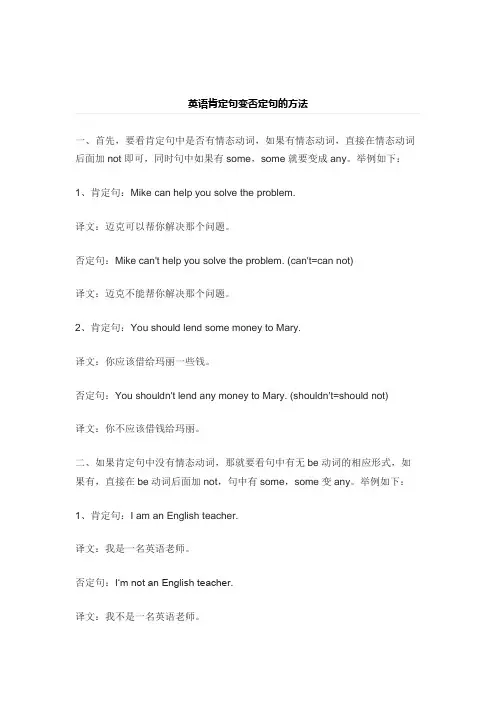
一、首先,要看肯定句中是否有情态动词,如果有情态动词,直接在情态动词后面加not即可,同时句中如果有some,some就要变成any。
举例如下:1、肯定句:Mike can help you solve the problem.译文:迈克可以帮你解决那个问题。
否定句:Mike can't help you solve the problem. (can't=can not)译文:迈克不能帮你解决那个问题。
2、肯定句:You should lend some money to Mary.译文:你应该借给玛丽一些钱。
否定句:You shouldn't lend any money to Mary. (shouldn't=should not)译文:你不应该借钱给玛丽。
二、如果肯定句中没有情态动词,那就要看句中有无be动词的相应形式,如果有,直接在be动词后面加not,句中有some,some变any。
举例如下:1、肯定句:I am an English teacher.译文:我是一名英语老师。
否定句:I‘m not an English teacher.译文:我不是一名英语老师。
2、肯定句:There are some books on the desk.译文:书桌上有一些书。
否定句:There aren't any books on the desk.译文:书桌上没有书。
三、如果肯定句中既没有情态动词,也没有be动词,那么就要用相应的助动词加上not来变换,句中有some,some变any。
举例如下:1、肯定句:She likes helping others.译文:她喜欢帮助别人。
否定句:She doesn't like helping others.译文:她不喜欢帮助别人。
2、肯定句:They have some apples.译文:他们有一些苹果。
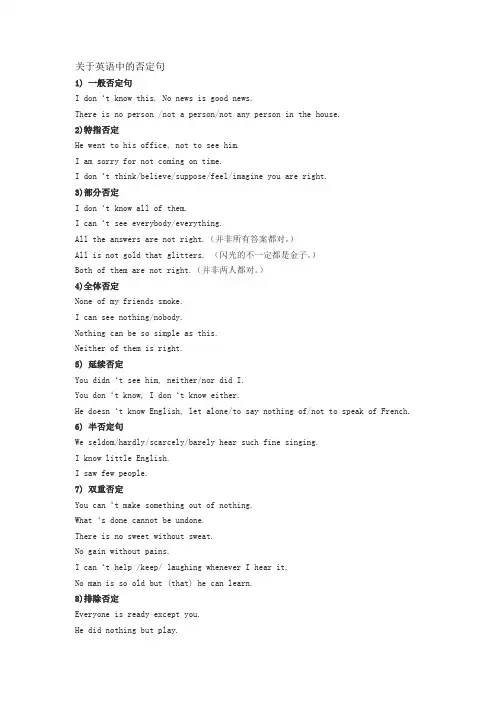
关于英语中的否定句1) 一般否定句I don‘t know this. No news is good news.There is no person /not a person/not any person in the house.2)特指否定He went to his office, not to see him.I am sorry for not coming on time.I don‘t think/believe/suppose/feel/imagine you are ri ght.3)部分否定I don‘t know all of them.I can‘t see everybody/everything.All the answers are not right.(并非所有答案都对。
)All is not gold that glitters. (闪光的不一定都是金子。
)Both of them are not right.(并非两人都对。
)4)全体否定None of my friends smoke.I can see nothing/nobody.Nothing can be so simple as this.Neither of them is right.5) 延续否定You didn‘t see him, neither/nor did I.You don‘t know, I don‘t know either.He doesn‘t know English, let alone/to say nothing of/not to speak of French.6) 半否定句We seldom/hardly/scarcely/barely hear such fine singing.I know little English.I saw few people.7) 双重否定You can‘t make something out of nothing.What‘s done cannot be undone.There is no sweet without sweat.No gain without pains.I can‘t help /keep/ laughing whenever I hear it.No man is so old but (that) he can learn.8)排除否定Everyone is ready except you.He did nothing but play.But for your help, I couldn‘t do it.9)加强否定I won‘t do it at all.I can‘t see it any more.He is no longer a boy。
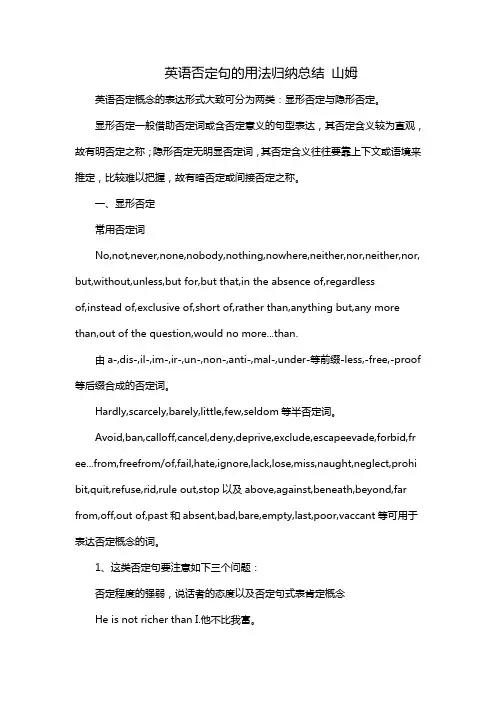
英语否定句的用法归纳总结山姆英语否定概念的表达形式大致可分为两类:显形否定与隐形否定。
显形否定一般借助否定词或含否定意义的句型表达,其否定含义较为直观,故有明否定之称;隐形否定无明显否定词,其否定含义往往要靠上下文或语境来推定,比较难以把握,故有暗否定或间接否定之称。
一、显形否定常用否定词No,not,never,none,nobody,nothing,nowhere,neither,nor,neither,nor, but,without,unless,but for,but that,in the absence of,regardlessof,instead of,exclusive of,short of,rather than,anything but,any more than,out of the question,would no more...than.由a-,dis-,il-,im-,ir-,un-,non-,anti-,mal-,under-等前缀-less,-free,-proof 等后缀合成的否定词。
Hardly,scarcely,barely,little,few,seldom等半否定词。
Avoid,ban,calloff,cancel,deny,deprive,exclude,escapeevade,forbid,fr ee...from,freefrom/of,fail,hate,ignore,lack,lose,miss,naught,neglect,prohi bit,quit,refuse,rid,rule out,stop以及above,against,beneath,beyond,far from,off,out of,past和absent,bad,bare,empty,last,poor,vaccant等可用于表达否定概念的词。
1、这类否定句要注意如下三个问题:否定程度的强弱,说话者的态度以及否定句式表肯定概念He is not richer than I.他不比我富。
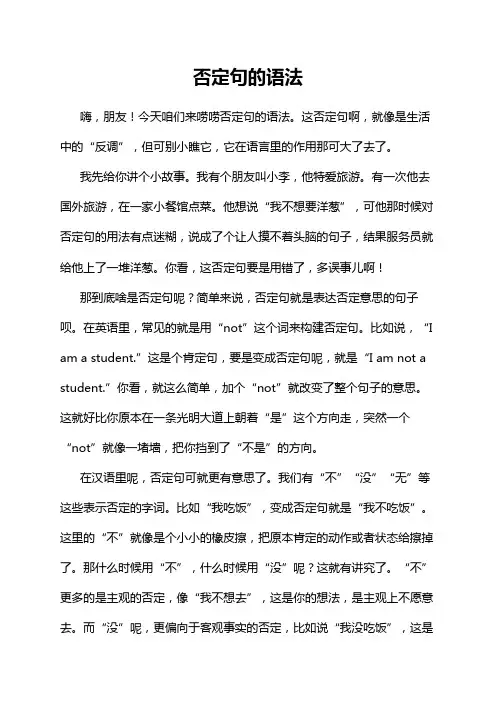
否定句的语法嗨,朋友!今天咱们来唠唠否定句的语法。
这否定句啊,就像是生活中的“反调”,但可别小瞧它,它在语言里的作用那可大了去了。
我先给你讲个小故事。
我有个朋友叫小李,他特爱旅游。
有一次他去国外旅游,在一家小餐馆点菜。
他想说“我不想要洋葱”,可他那时候对否定句的用法有点迷糊,说成了个让人摸不着头脑的句子,结果服务员就给他上了一堆洋葱。
你看,这否定句要是用错了,多误事儿啊!那到底啥是否定句呢?简单来说,否定句就是表达否定意思的句子呗。
在英语里,常见的就是用“not”这个词来构建否定句。
比如说,“I am a student.”这是个肯定句,要是变成否定句呢,就是“I am not a student.”你看,就这么简单,加个“not”就改变了整个句子的意思。
这就好比你原本在一条光明大道上朝着“是”这个方向走,突然一个“not”就像一堵墙,把你挡到了“不是”的方向。
在汉语里呢,否定句可就更有意思了。
我们有“不”“没”“无”等这些表示否定的字词。
比如“我吃饭”,变成否定句就是“我不吃饭”。
这里的“不”就像是个小小的橡皮擦,把原本肯定的动作或者状态给擦掉了。
那什么时候用“不”,什么时候用“没”呢?这就有讲究了。
“不”更多的是主观的否定,像“我不想去”,这是你的想法,是主观上不愿意去。
而“没”呢,更偏向于客观事实的否定,比如说“我没吃饭”,这是在陈述一个客观存在的情况,就是饭还没吃到肚子里。
我再给你说说我教我小侄子学否定句的事儿。
小侄子特别调皮,他老是说一些肯定句,像“我要吃所有的糖”。
我就想教他否定句,我就说:“你要是一直这么吃糖,牙齿都要坏掉啦,你可不能吃所有的糖。
”他就歪着脑袋问我:“为啥呀?”我就跟他说:“你看啊,如果你说‘我要吃所有的糖’,这就像是你要把一个装满糖的大罐子都倒进自己嘴巴里。
可是你说‘我不能吃所有的糖’,就像是你给这个大罐子加了个盖子,只允许自己吃一点点。
”他似懂非懂地点点头。
这就说明啊,用一些简单的比喻能让我们更好地理解否定句。
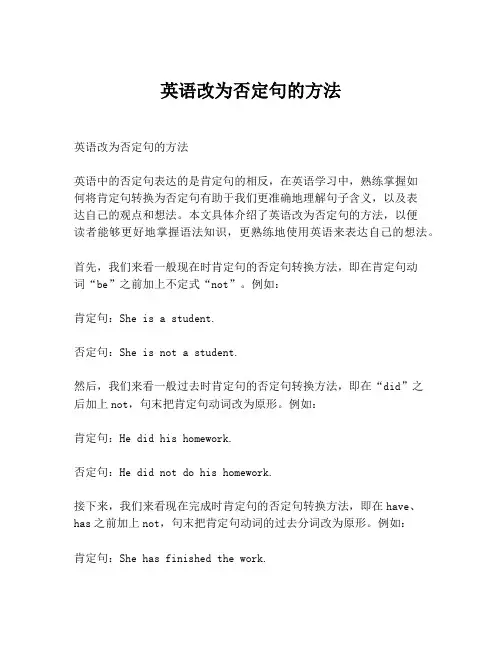
英语改为否定句的方法英语改为否定句的方法英语中的否定句表达的是肯定句的相反,在英语学习中,熟练掌握如何将肯定句转换为否定句有助于我们更准确地理解句子含义,以及表达自己的观点和想法。
本文具体介绍了英语改为否定句的方法,以便读者能够更好地掌握语法知识,更熟练地使用英语来表达自己的想法。
首先,我们来看一般现在时肯定句的否定句转换方法,即在肯定句动词“be”之前加上不定式“not”。
例如:肯定句:She is a student.否定句:She is not a student.然后,我们来看一般过去时肯定句的否定句转换方法,即在“did”之后加上not,句末把肯定句动词改为原形。
例如:肯定句:He did his homework.否定句:He did not do his homework.接下来,我们来看现在完成时肯定句的否定句转换方法,即在have、has之前加上not,句末把肯定句动词的过去分词改为原形。
例如:肯定句:She has finished the work.否定句:She has not finished the work.再接下来,我们来看现在完成进行时肯定句的否定句转换方法,即在have、has之前加上not,句末把been改为being,肯定句动词的过去分词改为原形。
例如:肯定句:He has been studying for two hours.否定句:He has not been studying for two hours.此外,我们还可以使用人称代词的反义词形式来否定句子,例如:肯定句:He is smart.否定句:He is not smart.最后,我们来看祈使句的否定句转换方法,即在祈使句的开头加上Don't 或 Not,句末把肯定句动词改为原形。
例如:肯定句:Go away.否定句:Don't go away.总之,在英语中,想要表达不同的意思,有时只需要加上简单的几个词就能完成,我们只需要熟练掌握改变肯定句为否定句的方法,就可以更准确地表达自己的观点和想法,发挥出自己的英语水平。
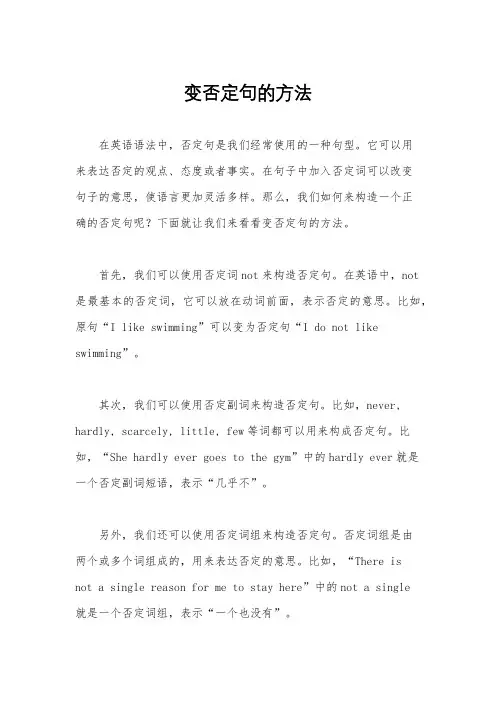
变否定句的方法在英语语法中,否定句是我们经常使用的一种句型。
它可以用来表达否定的观点、态度或者事实。
在句子中加入否定词可以改变句子的意思,使语言更加灵活多样。
那么,我们如何来构造一个正确的否定句呢?下面就让我们来看看变否定句的方法。
首先,我们可以使用否定词not来构造否定句。
在英语中,not是最基本的否定词,它可以放在动词前面,表示否定的意思。
比如,原句“I like swimming”可以变为否定句“I do not like swimming”。
其次,我们可以使用否定副词来构造否定句。
比如,never, hardly, scarcely, little, few等词都可以用来构成否定句。
比如,“She hardly ever goes to the gym”中的hardly ever就是一个否定副词短语,表示“几乎不”。
另外,我们还可以使用否定词组来构造否定句。
否定词组是由两个或多个词组成的,用来表达否定的意思。
比如,“There isnot a single reason for me to stay here”中的not a single就是一个否定词组,表示“一个也没有”。
此外,我们还可以使用否定代词来构造否定句。
比如,nobody, nothing, none等词都可以用来构成否定句。
比如,“There is nothing I can do about it”中的nothing就是一个否定代词,表示“没有什么”。
最后,我们还可以使用否定形容词来构造否定句。
比如,impossible, unhappy, unkind等词都可以用来构成否定句。
比如,“It is impossible for him to finish the task on time”中的impossible就是一个否定形容词,表示“不可能的”。
总的来说,构造否定句的方法有很多种,我们可以根据具体的语境和需要来选择合适的方式。
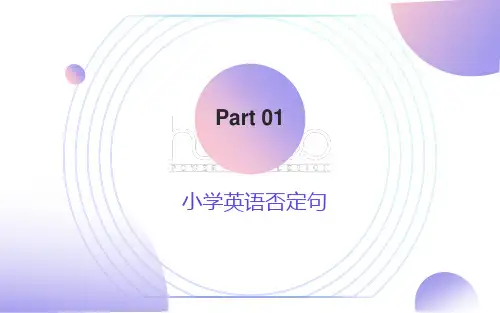
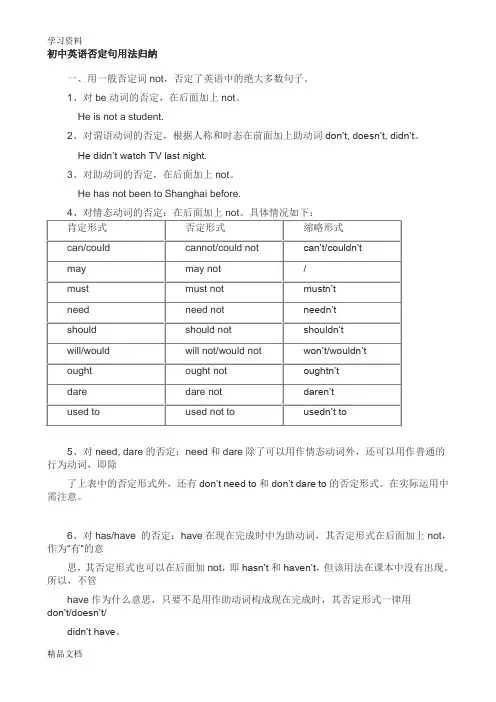
初中英语否定句用法归纳一、用一般否定词not,否定了英语中的绝大多数句子。
1、对be动词的否定,在后面加上not。
He is not a student.2、对谓语动词的否定,根据人称和时态在前面加上助动词don’t, doesn’t, didn’t。
He didn’t watch TV last night.3、对助动词的否定,在后面加上not。
He has not been to Shanghai before.5、对need, dare的否定:need和dare除了可以用作情态动词外,还可以用作普通的行为动词,即除了上表中的否定形式外,还有don’t need to和don’t dare to的否定形式。
在实际运用中需注意。
6、对has/have 的否定:have在现在完成时中为助动词,其否定形式在后面加上not,作为“有”的意思,其否定形式也可以在后面加not,即hasn’t和haven’t,但该用法在课本中没有出现。
所以,不管have作为什么意思,只要不是用作助动词构成现在完成时,其否定形式一律用don’t/doesn’t/didn’t have。
7、不定式的否定:在前面加上not。
即:ask / tell /…sb not to do sth。
8、动名词的否定:在前面加上not。
即:worry about not doing。
9、祈使句的否定:在句首加上Don’t。
如有please,在please后面加上don’t。
Please don’t talk in class.二、通过绝对否定词否定。
此类词如下:never, no, no one, nobody, nothing, nowhere, none, nei ther, neither…nor…, no more, no longer。
☆特别提醒:1、绝对否定词no相当于not…any…。
如no=not any, never=not ever, nothing=not anything, nowhere= not anywhere。
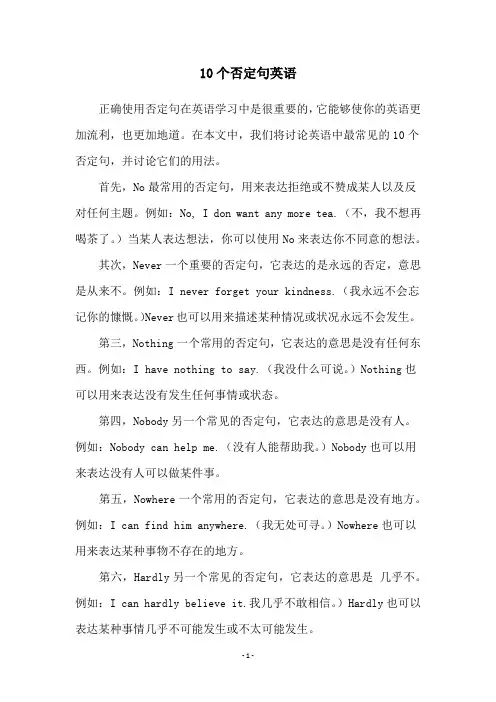
10个否定句英语正确使用否定句在英语学习中是很重要的,它能够使你的英语更加流利,也更加地道。
在本文中,我们将讨论英语中最常见的10个否定句,并讨论它们的用法。
首先,No最常用的否定句,用来表达拒绝或不赞成某人以及反对任何主题。
例如:No, I don want any more tea.(不,我不想再喝茶了。
)当某人表达想法,你可以使用No来表达你不同意的想法。
其次,Never一个重要的否定句,它表达的是永远的否定,意思是从来不。
例如:I never forget your kindness.(我永远不会忘记你的慷慨。
)Never也可以用来描述某种情况或状况永远不会发生。
第三,Nothing一个常用的否定句,它表达的意思是没有任何东西。
例如:I have nothing to say.(我没什么可说。
)Nothing也可以用来表达没有发生任何事情或状态。
第四,Nobody另一个常见的否定句,它表达的意思是没有人。
例如:Nobody can help me.(没有人能帮助我。
)Nobody也可以用来表达没有人可以做某件事。
第五,Nowhere一个常用的否定句,它表达的意思是没有地方。
例如:I can find him anywhere.(我无处可寻。
)Nowhere也可以用来表达某种事物不存在的地方。
第六,Hardly另一个常见的否定句,它表达的意思是几乎不。
例如:I can hardly believe it.我几乎不敢相信。
)Hardly也可以表达某种事情几乎不可能发生或不太可能发生。
第七,Nothing but一个常见的否定句,它表达的意思是除了其他一切,只有一件事发生。
例如:She has nothing but good intentions.(她只有善意的想法。
)Nothing but也可以用来表达仅有一件事情或一种情感发生。
第八,At no time另一个常见的否定句,它表达的意思是某件事永远不会发生。
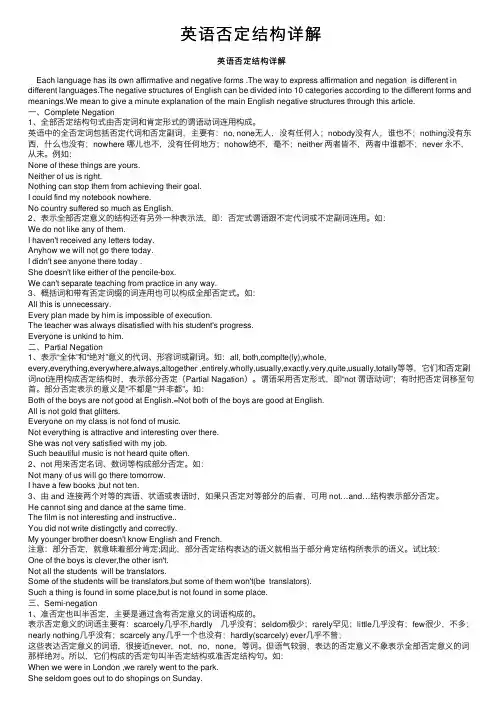
英语否定结构详解英语否定结构详解Each language has its own affirmative and negative forms .The way to express affirmation and negation is different in different languages.The negative structures of English can be divided into 10 categories according to the different forms and meanings.We mean to give a minute explanation of the main English negative structures through this article.⼀、Complete Negation1、全部否定结构句式由否定词和肯定形式的谓语动词连⽤构成。
英语中的全否定词包括否定代词和否定副词,主要有:no, none⽆⼈,没有任何⼈;nobody没有⼈,谁也不;nothing没有东西,什么也没有;nowhere 哪⼉也不,没有任何地⽅;nohow绝不,毫不;neither 两者皆不,两者中谁都不;never 永不,从未。
例如:None of these things are yours.Neither of us is right.Nothing can stop them from achieving their goal.I could find my notebook nowhere.No country suffered so much as English.2、表⽰全部否定意义的结构还有另外⼀种表⽰法,即:否定式谓语跟不定代词或不定副词连⽤。
如:We do not like any of them.I haven't received any letters today.Anyhow we will not go there today.I didn't see anyone there today .She doesn't like either of the pencile-box.We can't separate teaching from practice in any way.3、概括词和带有否定词缀的词连⽤也可以构成全部否定式。
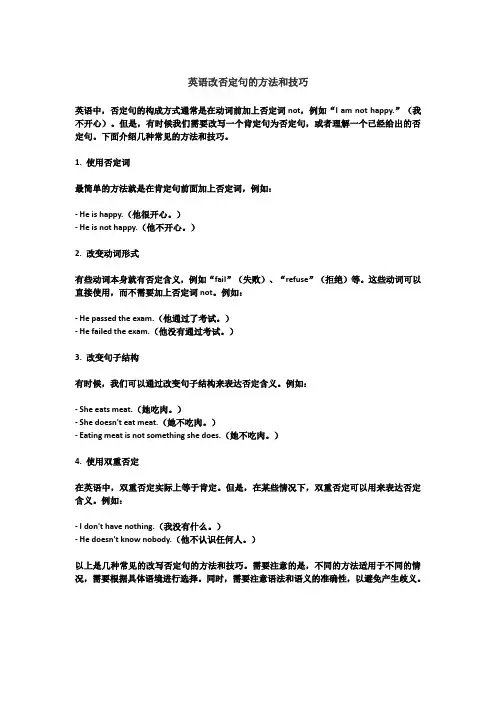
英语改否定句的方法和技巧英语中,否定句的构成方式通常是在动词前加上否定词not,例如“I am not happy.”(我不开心)。
但是,有时候我们需要改写一个肯定句为否定句,或者理解一个已经给出的否定句。
下面介绍几种常见的方法和技巧。
1. 使用否定词最简单的方法就是在肯定句前面加上否定词,例如:- He is happy.(他很开心。
)- He is not happy.(他不开心。
)2. 改变动词形式有些动词本身就有否定含义,例如“fail”(失败)、“refuse”(拒绝)等。
这些动词可以直接使用,而不需要加上否定词not。
例如:- He passed the exam.(他通过了考试。
)- He failed the exam.(他没有通过考试。
)3. 改变句子结构有时候,我们可以通过改变句子结构来表达否定含义。
例如:- She eats meat.(她吃肉。
)- She doesn't eat meat.(她不吃肉。
)- Eating meat is not something she does.(她不吃肉。
)4. 使用双重否定在英语中,双重否定实际上等于肯定。
但是,在某些情况下,双重否定可以用来表达否定含义。
例如:- I don't have nothing.(我没有什么。
)- He doesn't know nobody.(他不认识任何人。
)以上是几种常见的改写否定句的方法和技巧。
需要注意的是,不同的方法适用于不同的情况,需要根据具体语境进行选择。
同时,需要注意语法和语义的准确性,以避免产生歧义。
变否定句的方法否定句是我们日常语言中经常使用的一种句式,它可以用来表达否定的意思。
在英语中,构成否定句的方法有很多种,我们可以通过不同的方式来对句子进行否定。
下面就让我们来看一看变否定句的方法。
首先,我们可以使用not来构成否定句。
比如,原句是“I am happy.”,要变成否定句就可以写成“I am not happy.”。
在这个例子中,我们通过在动词am后加上not来构成否定句。
这是一种常见的构成否定句的方法。
其次,我们可以使用no来构成否定句。
比如,原句是“There is a cat.”,要变成否定句就可以写成“There is no cat.”。
在这个例子中,我们通过将动词is后的a 替换为no来构成否定句。
这也是一种常见的构成否定句的方法。
另外,我们还可以使用never来构成否定句。
比如,原句是“She always arrives on time.”,要变成否定句就可以写成“She never arrives on time.”。
在这个例子中,我们通过将always替换为never来构成否定句。
这同样是一种常见的构成否定句的方法。
除了上述的方法,我们还可以使用hardly, scarcely, barely, little, few等词来构成否定句。
比如,“She hardly ever goes to the gym.”,“There is little chance of success.”等等。
这些词在句子中可以起到否定的作用,帮助我们表达否定的意思。
总的来说,构成否定句的方法有很多种,我们可以根据句子的具体情况来选择合适的方法。
通过灵活运用这些方法,我们可以更准确地表达自己的意思,使语言表达更加丰富多彩。
希望通过本文所介绍的方法,大家能够更加熟练地运用否定句,提高自己的语言表达能力。
英语否定句用法一、部分否定和全部否定英语中否定句的结构和中文有很多不同的地方,学习者不能用中文的思维方式来逐字翻译成英语的否定句。
例如:All the idioms are not (或:Not all the idioms are)illustrated.初学英语者往往容易按中文的思维习惯,把这句话译成“所有的习语都没有例证。
”这是不对的。
这句话是部分否定,即“不都是”,含义是部分是,部分不是。
翻译成中文是“不是每一个习语都有例证。
”如果说所有的习语都没有例证,英语应该是:None of the idioms is illustrated.这样的例子有很多,请比较下列几组句子:Not both of them can speak English.并不是两人都会说英语。
(部分否定)比较:Neither of them can speak English.两人都不会说英语。
(全部否定)Everyone cannot do it. 并非每个人都能做此事。
(部分否定)比较:No one can do it. 没人能做此事。
(全否)All of us have not been to America. 我们并没都去过美国。
(部分否定)比较:All of us have never been to America. 我们都没去过美国。
(全否)All of us have not done anything wrong. 并不是所有的人都做错了。
(部否)比较All of us have done nothing wrong. 我们都没有做错任何事。
(全否)None of us have done anything wrong. 我们都没有做错任何事。
(全否)All my children don’t have any of these bad habits. 并不是我所有的孩子都有这些坏习惯。
(部分否定)比较:All my children have none of these bad habits. 我所有的孩子都没有这些坏习惯。
英语变否定句的方法英语中,要将一般陈述句变成否定句,通常需要在句子中加入否定词或使用辅助动词do/does/did,并将动词原形改为其否定形式。
下面我将详细解释英语中变否定句的方法,并给出一些例子。
1. 使用否定词:在英语中,有很多表示否定的词,比如:not、never、no、none、neither、nobody、nowhere等。
将这些词插入到句子中可以将句子变成否定句。
例如:- He is happy.(他很开心。
)- He is not happy.(他不开心。
)- They have finished their work.(他们完成了工作。
)- They have not finished their work.(他们还没完成工作。
)2. 使用辅助动词do/does/did:在一般陈述句中,辅助动词do/does/did用于疑问句和否定句中,以表示动作的否定。
例如:- She goes to school.(她去学校。
)- She does not go to school.(她不去学校。
)- He likes ice cream.(他喜欢冰淇淋。
)- He does not like ice cream.(他不喜欢冰淇淋。
)- They played soccer.(他们踢足球。
)- They did not play soccer.(他们没踢足球。
)需要注意的是,do表示现在和将来的否定,does表示第三人称单数的否定,did表示过去的否定。
3. 动词变为否定形式:在英语中,有些动词的否定形式是在动词原形后面加not构成的。
通常是将动词原形的词尾改为not。
例如:- I understand.(我理解。
)- I do not understand.或者I don't understand.(我不理解。
)- She knows the answer.(她知道答案。
)- She does not know the answer.或者She doesn't know the answer.(她不知道答案。
“否定形式”一、显性否定1●,none,nobody,nothing,nowhere,neither,nor,neither...nor,but,without,unless,but for,but that,in the absence of,regardless of,instead of,exclusive of,short of,rather than,anything but,any more than,out of the question,would no more...than●由a-,dis-,il-,im-,ir-,un-,non-,anti-,mal-,under-等前缀及-less,-free,-proof 等后缀合成的否定词●hardly,scarcely,barely,little,few,seldom 等半否定词●avoid,ban,call off,cancel,deny,deprive,exclude,escape,evade,forbid,free...from,free from/of,fail,hate,ignore,lack,lose,miss,naught,neglect,prohibit,quit, refuse,rid,rule out,stop 以及above,against,beneath,beyond,far from,off,out of,past 和absent,bad,bare,empty,last,poor,vacant 等可用于表达否定概念的词。
这类否定句要注意如下三个问题:否定程度的强弱,说话者的态度以及否定句式表肯定概念1.He is not richer than I. 他不比我富。
2.He is no richer than I. 他和我一样,也不富。
3.He is not a statesman. 他不是政治家。
4.He is no statesman. 他绝非政治家。
4.5否定句的表达英语和汉语在肯定和否定的表达形式上大致相同,所以一般情况可以直译,但是不乏有许多差异,在这里我们着重对这些差异加以讲解。
比如说,英语中表示否定并不一定都要使用否定词no、not、nor、neither、never等来否定谓语,多数时候往往可以借助其他含有否定意义的词来否定句子的某个成分,这样,谓语部分就以肯定形式出现。
下面将列举在翻译过程中一些应注意的规则。
4.5.1 一般规则A.否定词not与不定代词all, both, everyone, everything等一起使用,通常表示部分否定。
要表达完全否定,一般用动词的肯定形式加完全否定词none, neither, no, nobody, nothing, 或者not any, not either等表示。
例如:1)并非所有的思想都是这样产生的,但许多思想的产生确实如此。
All ideas don't occur like that but so many do.2)与高中老师不同,大学老师非常耐心和蔼,他们没有一个带教鞭!Unlike my senior middle school teacher, my college English teachers were patient and kind, and none of them carried long, pointed sticks! However,B. 在否定句中,一些连接词与肯定句中有所不同否定句中的“也”不能译成too,而应该用either,或者用neither(nor)的倒装句型。
在肯定句中用and来连接两个并列成分,表示“和”,但在否定句中and应改为or, 这时否定词对or的前后部分同时加以否定。
例如:现在回想起来我感到十分惊叹。
像他那样一个成年人,地有多大勇气才能经受这样的屈辱和压力,而当时他却显得没有痛苦和怨言。
When I think of it now, I am amazed at how much courage it must have taken for a grown man to subject himself to such shame and stress. And at how he did it — without bitterness or complaint.C. 汉语中的感叹句可用否定式,如:多不容易呀!但是英语中的感叹句不能用否定式,处理过程中,我们可用反义词或带有否定词缀的词来表达。
英语否定句句型1、句型为主语+情态动词(can,could,may,might,must,should等)+谓语动词:在情态动词(can,could,may,might,must,should等)后面加not 即构成否定句。
She could not help laughing.她禁不住笑了起来。
The old man cann't read and write.那老人没有文化(不会读写)。
You shouldn't have given up.你本不该放弃的。
(实际放弃了)You needn't do your homework today.今天你不必做作业。
(must 必须的否定,用need not 或don't have to)The kids mustn't swim without grown-ups nearby.没有大人在旁边,孩子们禁止在河里游泳。
(mustn't是“禁止,不允许”)2、句型为主语+谓语动词(谓语前没有助动词):在谓语动词前加助动词do/does/did not即构成否定句。
谓语动词用原形I don’t have any foreign friends. 我没有任何外国朋友。
She doesn’t know Mr. White. 她不认识怀特先生。
My mother doesn’t speak English. 我母亲不会讲英语。
It didn't rain last night. 昨晚没有下雨。
Mary didn’t clean the room this morning. 玛丽今天早晨没打扫了房间。
John didn’t get up early this morning. 约翰今天早晨没有早起床。
Do not swicth off (祈使句的否定)。
英语否定句综合教程一、转换否定引用薄冰的原话,是“在英语中常可见到一些……形式上否定而意义上则表肯定的句子”。
1.cannot…tooYou cannot be too careful.误译:你不能太小心。
正译:你越小心越好。
英语说的cannot…too,意为“就算再……也不过分”或“越……越好”,其中的can表示可能性,too有over之意,可以换用enough或sufficient等字样。
同时,在not的位置换用其他的否定词,如hardly,scarcely等也是可以的。
因此下面5句话的意思同上面这句话的意思是完全一样的。
You cannot be over careful.You cannot be careful enough.You cannot be sufficiently careful.You cannot take enough care.You cannot take sufficient care.2.It is a good horse that never stumbles.误译:从不失蹄的马才是好马。
正译:再好的马也有失蹄的时候。
这个句子属于“It be adjective noun that…”句型。
该句型多出现在一些谚语中, 在某些情况下,这种句型需要从反面解释。
更多的例子:It is a long lane that has no turning.再长的胡同也有拐弯。
(意思是:凡事总有变化,不会永远不变。
)3.He must be a fool if he does not know what I mean.误译:如果他不懂我的意思,他肯定是个傻瓜。
正译:他就是再傻也会懂得我的意思。
4.She study no harder than me.误译:她学习不如我努力。
正译:她和我学习都不努力。
在一些no(not) adj.比较级的句子里,意思是肯定的。
更多的例子:I couldn‟t agree with you more .我非常同意你的观点。
5.I never got no sleep in those days.误译:那些日子我从来没有不睡觉。
正译:那些日子我怎么也睡不着。
英语和汉语一样,本来两个否定会成为一个肯定,但有时为了强调否定的语气,在通俗的口语中会有双重否定仍表否定的情况。
更多的例子:“I don’t know nothing about what’s waiting for me,”said Thrash.施腊希说:“我不知道我未来的命运如何。
”二、否定句并非都表示否定(一)含有否定词not,no,nothing,never等或表示部分否定的词hardly,barely等的句子被称为否定句。
英语的否定句表现形式多种多样,应用十分广泛,但形式上的否定并不等于意义上的否定,在很多情况下,形式上的否定句表达的却是肯定的含义,需注意这类句子的理解和译法。
1.not…until till直到……才,只有……才People do not know the importance of friends until they lose them.人们直到失去了才知道朋友的重要。
You can not learn anything till you get rid of your complacency.只有去掉自满,你才能真正学点东西。
It was not until midnight that we went to bed.直到半夜,我们才去睡觉。
2.not…long before 很快就,不久就It wasn‟t long before the conqured the country.不久他们就征服了这个国家。
It won‟t be long before we finish the work.我们很快就会干完这活儿。
It will not be long before they finish the work.他们很快就会干完活儿。
(二)否定表肯定Cannot can never 和too, too much, enough, over 搭配表示“无论怎样……也不会过分,越……越好”This can‟t be stressed too strongly.这一点怎么强调也不过分”。
While you are doing your homework, you can‟t be careful enough.你做作业的时候,越小心越好。
The development of society has made it necessary for us to have a good knowledge of Enghish, so we can‟t over emphasize the importance of learning English.1.某些疑问句、感叹句或否定祈使句的表达与回答例如:---You haven‟t been to Quanzhou, have you?---No, I haven‟t. 是的,我没有去过。
比较:---Yes, I have. 不,我有去过。
又如:---Lovely day today, isn‟t it?---Yes, isn‟t it? (降调) 是啊,真好。
Isn‟t that beautiful! (感叹) 多么美丽呀!再如:Won‟t you have some beer?=Why not have some beer? (邀请)请喝点啤酒吧!---Take care and don‟t eat any more fish.---I won‟t. 好的,我不会再吃的。
2.too…to…结构例如:I‟m sure many firms would only be too glad to have you.我想好多公司都会非常乐意雇佣你。
又如:The boy was too eager to get the piano. 那男孩非常想得到那架钢琴。
该结构中的形容词往往具有情感色彩,类似还有willing, ready, pleased, anxious等词。
3.cannot … too(much) 或can never/hardly…enough结构例如:I cannot thank you too much. = I can never/hardly thank you enough.我对你感激不尽。
此结构意为“无论如何…也不过分”。
它还有几个变体的结构:用impossible, difficult等词代替cannot;以sufficiently, exaggerate, to over-等词替代too/enough。
再如:You cannot take sufficient care. 你要特别小心。
The importance of this session cannot be exaggerated (overemphasized).=It would be impossible to over-estimate the importance of this session.这次会议极为重要。
4. 某些含有比较级的句子例如:Considering she will be my wife, I couldn‟t be any happier.一想到她将成为我的妻子,我就幸福无比。
又如:I couldn‟t agree more. 我完全同意。
三、某些说明哲理的句子例如:It is a wise man that never makes mistakes. 智者千虑必有一失。
又如:It is a good horse that never stumbles (绊倒) . 金无足赤,人无完人。
It is a good machine that can work without power. 不论如何好的机器都需要动力。
比较:It is a wise father that knows his own child. 聪明的父亲也未必了解他自己的孩子。
四、某些短语例如:It has caused me not a little anxiety. 此事使我相当焦虑。
比较:He's not a bit better. 他一点也没有好转。
再如:During his absence in London, I paid a visit to him.当他在伦敦的时候,我去拜访过他。
这里absence in = presence in,而absence from London 才表示不在伦敦。
五、肯定表否定1.某些引导词引导的从句1)before 引导的从句,其动词常与can连用,表明该动作并未发生,意为“不等…就….”。
亦表示“宁愿(与其)…也不…. ”。
例如:The boy rushed out before I could ask what his name was.我还没来得及问那小孩的名字,他就已经跑出去了。
He died before he wrote a will. 他还来不及写遗嘱就死了。
再如:He will beg for food before he will ask his parents for money.他宁可讨饭也不愿意向父母要钱。
2)since 引导的时间状语时,若从句谓语动词为持续性动词或状态动词的一般过去时,在大多数情况下,该句式表示主句的动作(或状态)是从从句的“动作或状态结束时”开始的。
例如:I have stayed at home since I was ill. 自从病愈后,我一直呆在家里。
再如:Six months have elapsed since he smoked. 转眼间他戒烟已有六个月。
比较:I have stayed at home since I have been ill. 自从生病以来,我一直呆在家里。
从句的动词用一般现在完成时,则表示从句动作或状态持续到今。
3)but 引导的定语从句时,从句表示否定涵义,but相当于关系代词“that (or who) not”。
例如:There is no one but knows it. 此事无人不知。
There was no man but thanked him. 人人都感激他。
2.某些短语或单词1)anything but“根本不是,一点也不”例如:Now, you can see, the battle is anything but finished.现在,你可以看到这个战役远远没有结束。